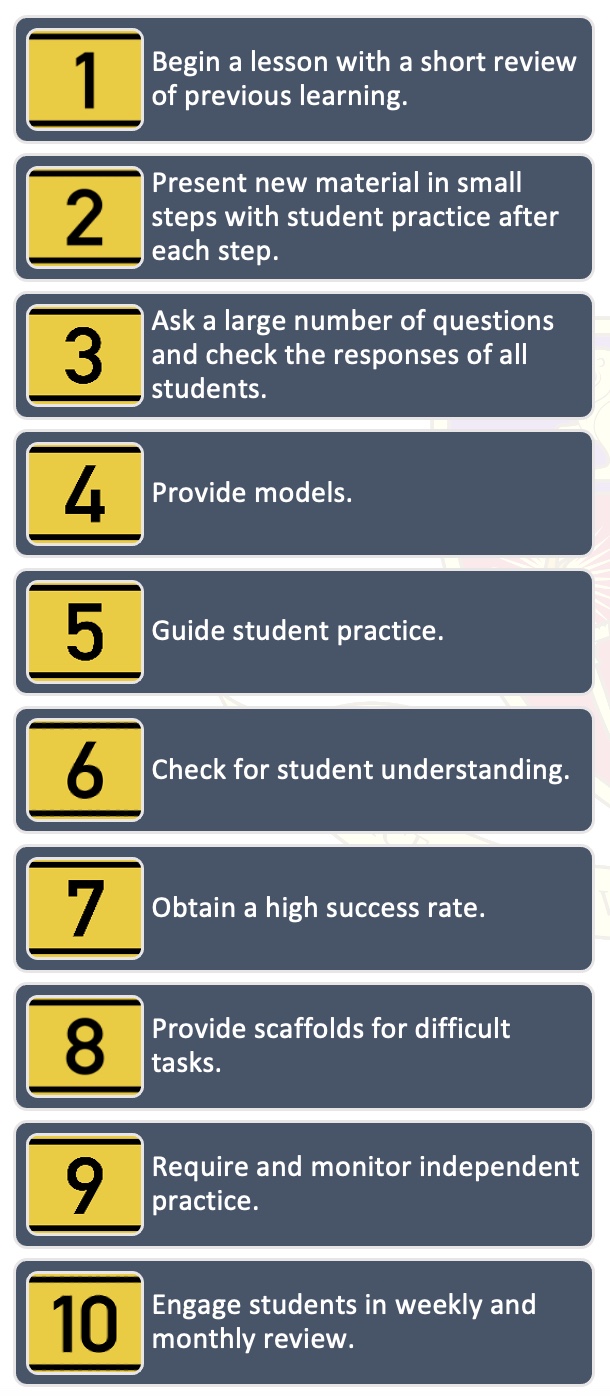
June 2021 Edition

By Natalija Skegro
Share
Leading with Rosenshine’s Principles
Rosenshine has become familiar to many of us in the profession, especially when looking at research-informed strategies that can enhance our practice. His work on the ‘Principles of Instruction’[1] is yet another example as to why our understanding of cognitive science and expert teaching is so important. Before Natalija joined Avanti, she had already immersed herself in Rosenshine’s findings and has looked forward to bringing them to the forefront of the minds of the teachers within our PRE Department.
Natalija recalled one of her first meetings with the team, which focused on outlining the intent and how this could tie into the Avanti Way. Influenced by Blooms Taxonomy and her pursuit to embed metacognitive strategies into the department’s implementation plan, she started with amplifying the importance of ‘effective teaching’

Figure 1 – Rosenhine’s Principles of Instruction
Natalija’s first steps were to outline the importance of spaced retrieval and how R1 (Rosenshine’s First Principle) was vital to the successful delivery to a sequence of lessons. By asking her teams to think about what, when and how short reviews of previous learning would take place; Natalija set the wheels in motion to improve the flow of lessons in the PRE curriculum. The next principles that she prioritised were R2 – 5 and R8.
When I asked Natalija why she chose to go through with this order, she explained that there was some good practice already embedded in the department. Hence, after evaluating the current impact of the delivery of their schemes of work, she decided to act on the evidence such that:
- R1: Content is there but needs to be reviewed effectively and in a timely manner to take into account for Ebbing’s Forgetting Curve and Spaced Retrieval. This could be a quick win with a large positive impact
- R2: Once the pupils are reviewing the relevant content, they can build upon their prior knowledge when covering new material, which assists with schema building. This is a process that can support encoding information into long term memory and enhances the ability to recall information.
- R3 – 5: Asking open questions within the PRE curriculum is good, but like all subjects, we need to think about how all pupils can have the opportunity to become involved in how that information is processed.
- R8: Differentiation is seen as a key part of expert teaching, but activities that develop skills or introduce new content need to be scaffolded appropriately. Pupils should be recalling and building upon prior knowledge. Then the scaffolding can truly live up to its label by being removed when pupils undergo guided practice to work towards mastery. This will also give R7 (High Success Rate).
Natalija explained how R7 played a huge part of her intent for the department. For pupils to develop an emotional attachment to their studies, they must also have some sense of progress. It is also important to not allow pupils to work independently for larger periods of time on errors, or else misconceptions may occur and demotivation may work against their levels of engagement.
In a brief meeting with Natalija recently, she explained how she intends to take her next steps in developing teaching and learning in PRE. Before viewing the ‘17 Principles of Effective Instruction’, or even before a more carful approach towards R6 or R9, Natalija wanted to model (R4) how one might teach a lesson, without explicitly linking the principles until the end.
By understanding the cognitive science behind Rosenshine’s Principles, Natalija truly modelled the potential impact that a department may have through research informed teaching and learning. She outlined her unique perspective on educators to provide more understanding behind her approach:
“I firmly believe that the most important duty of a teacher is to explicitly teach students how learning works. I demythologise learning processes by providing ideas, ways and schemes for moving information from working to short and ultimately long term memory.”
Some of the next steps she has planned for her department are to develop two knowledge tests per each scheme of work and to assure that pupils’ starter activities include either meaningful recall activities or strategies that prime pupils’ brains for the topic. Finally, through continuous reflective practice based on Bloom’s Taxonomy and Rosenshine’s POI, to assure that the main body of lessons have engaging tasks that enhance students’ love of learning.
“A good teacher can inspire hope, ignite the imagination, and instil a love of learning.”
Brad Henry
